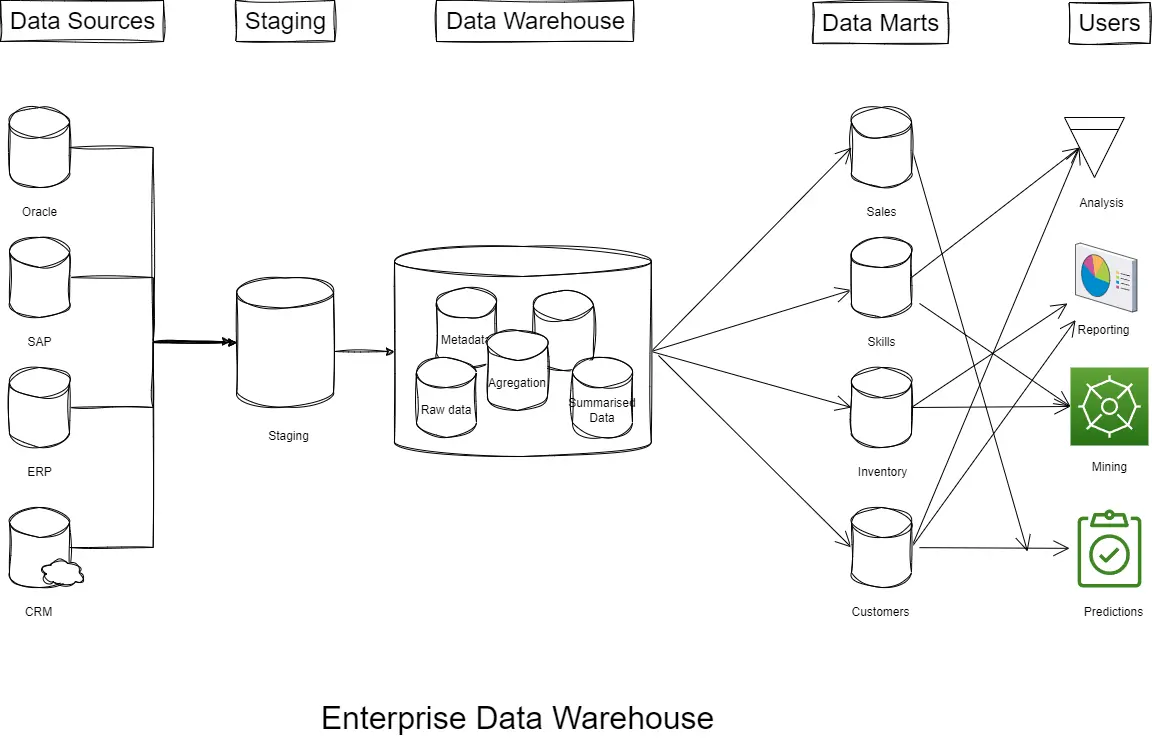Enterprise Data Warehouse
26 Jul 2023Empowering Informed Decision-Making and Analytics
In today’s data-driven business landscape, enterprises must efficiently manage and analyze vast amounts of data to gain valuable insights for strategic decision-making. The Enterprise Data Warehouse (EDW) is a critical solution that empowers organizations to consolidate, store, and analyze data from various sources, fostering a comprehensive view of their operations. In this article, we delve into the concept of the Enterprise Data Warehouse, its key features, benefits, and its pivotal role in driving business success.
Understanding the Enterprise Data Warehouse (EDW)
An Enterprise Data Warehouse is a large, centralized repository that combines data from diverse sources, including internal systems, external sources, applications, and other data streams. The primary goal of an EDW is to provide a unified and historical view of an organization’s data to support business intelligence, reporting, and advanced analytics.
The architecture of an EDW typically involves the extraction, transformation, and loading (ETL) process. Data from operational systems undergo change and integration before being loaded into the EDW, ensuring consistent and reliable data for analysis.

Key Features of the Enterprise Data Warehouse
-
Data Integration: The EDW serves as a centralized hub for data integration, allowing data from various sources and formats to be combined seamlessly. This integration helps eliminate data silos, fostering a more holistic view of the organization’s data.
-
Historical Data Storage: Unlike operational databases that store real-time data, an EDW retains historical data over an extended period. This historical data provides valuable context for trend analysis, performance tracking, and strategic planning.
-
Data Cleansing and Quality Control: Data quality is crucial for accurate analysis and decision-making. The EDW includes data cleansing and quality control processes to ensure that data is consistent, accurate, and error-free.
-
Scalability and Performance: An EDW is designed to handle large volumes of data and complex queries from multiple users. Its architecture ensures scalability and optimized performance to support enterprise-wide analytics needs.
-
Business Intelligence and Analytics: The EDW is a foundational business intelligence and advanced analytics element. It enables data analysts and decision-makers to generate reports, dashboards, and insights that drive business growth and efficiency.
Benefits of the Enterprise Data Warehouse
-
Unified View of Data: By consolidating data from various sources into a single repository, the EDW provides a unified view of the organization’s data. This integrated view allows stakeholders to understand business performance and trends comprehensively.
-
Informed Decision-Making: The availability of timely, accurate, and historical data empowers decision-makers to make well-informed choices. From tactical to strategic decisions, the EDW ensures that data-driven insights drive the decision-making process.
-
Improved Data Analysis: With historical data at their disposal, data analysts can perform in-depth analysis, identify patterns, and predict future trends. This analytical capability allows organizations to address challenges and capitalize on opportunities proactively.
-
Enhanced Business Performance: The insights derived from the EDW aid in identifying inefficiencies, optimizing processes, and improving overall business performance.
-
Data Governance and Compliance: Centralizing data in an EDW promotes better data governance and compliance with data security regulations. Access controls and data auditing mechanisms are implemented to ensure data integrity and security.
Conclusion
In the information age, the Enterprise Data Warehouse stands as a powerful tool for organizations seeking to unlock the value of their data. By consolidating and integrating data from diverse sources, the EDW empowers enterprises to make data-driven decisions, gain deeper insights, and drive business success.
As data plays a central role in shaping business strategies, the Enterprise Data Warehouse will continue to evolve, adopting new technologies and methodologies to meet the growing demands of data analytics. Embracing an EDW is a wise investment and a strategic move that positions organizations to thrive in today’s dynamic and competitive business landscape and beyond.